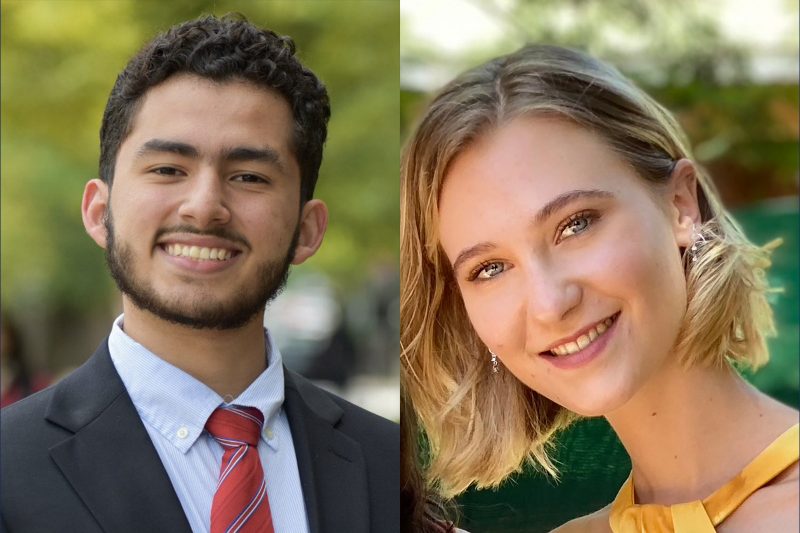Yale College undergraduates Lucy Calcott ‘25 and Rolando Kattan Rubi ’25 will spend this summer in South Africa and Honduras, respectively, implementing projects that address critical societal issues.
Two Global Affairs majors were named recipients of Davis Projects for Peace grants, which provide funding for innovative, community-centered projects that address the world’s most critical issues.
The students, Lucy Calcott ’25 and Rolando Kattan Rubi ’25, were among 126 winners from 92 partner institutions. Projects can address a diversity of issues, including education, public health, social cohesion, and cultural preservation. The grant is administered by Middlebury College in Vermont.
“We are incredibly proud of Lucy and Rolando for receiving this distinction,” says Lily Sutton, assistant dean for student affairs at the Jackson School for Global Affairs. “Their projects are such a wonderful reflection of the innovation and thoughtfulness our students apply to global challenges and the extraordinary passion they have for making the world a better place.”
Calcott will travel to the Limpopo Province of South Africa, where children face a disproportionately high risk of domestic violence, poverty and, recently, the loss of family during the COVID-19 pandemic, according to Calcott, who spent her childhood there.
Children under five years old, she says, are at particular risk of stunted cognitive development due to these stressors. Their teachers, who are predominately inexperienced and underpaid, often shoulder a large burden of addressing these issues.
“During this sensitive period, critical neural connections are formed that will have an impact on the child for the rest of their life,” Calcott says. “Correct nutrition, stimulation, and addressing brain-damaging toxic stress is crucial.”
This summer, Calcott aims to empower the local educators through information and training sessions, including how to identify toxic stress in children and learning innovative teaching methods for dealing with toxic stress. She also hopes to create sustainable dialogue between parents and educators about these issues through school and community events.
Calcott worked as an educator for three years before attending Yale and was initially planning to study cognitive science and early childhood development. She switched her major to global affairs, she says, to address issues of education at a broader scale, such as the impact on workforces and economies and women’s and children’s rights.
“I’m looking forward to taking more courses that will prepare me to tackle these issues through policy, law, and non-profit organizations,” says Calcott, who also hopes to establish a new human rights student organization at Yale next year.
Kattan Rubi will also be headed home to his native country — Honduras — where he will focus his project on issues of inequity in menstruation and reproductive health. Working with regional NGOs focused on menstrual rights, he will help organize a month of festivals, workshops, and lobbying sessions aimed at raising awareness of “menstrual poverty and the lack of reproductive education in the country,” he says.
The month will culminate with a conference that will bring together stakeholders for the Honduran Congress, the executive branch, the United Nations, the World Bank, and the private and public sectors to promote a bill that removes taxation from basic menstrual hygiene products. There will also be a “hackathon” that provides seed funding for a social impact project proposed by local youth and NGO members.
“Removing the ‘evil tax’ from menstrual products is just the first step,” Kattan Rubi says. “My project seeks to start conversations about highly stigmatized topics surrounding menstruation and reproductive health in a culturally conservative society.
“I envision a legislative strategy that starts with a tax exoneration but is followed by including menstrual and reproductive education in the national curriculum, providing menstrual products in public spaces, and granting menstrual licenses for workers that need them.”
Kattan Rubi says that as someone who does not menstruate, he has “had to navigate the space with sensitivity and awareness of my positionality.” He says that studying both global affairs and comparative literature at Yale have taught him “the value of inquiring beyond your personal horizons and sympathizing with the needs of your neighbors” — a particularly important part of his Latin American identity.
“I’ve gained the empowerment to discover but also define, mold and expand the meaning of that identity so that ‘Latinidad’ [a shared sense of Latino identity] is a concept that can be shared by all.”
Since the program was founded in 2008, nearly 20 Yale students have been awarded $10,000 grants to implement Projects for Peace in more than a dozen countries around the world.
